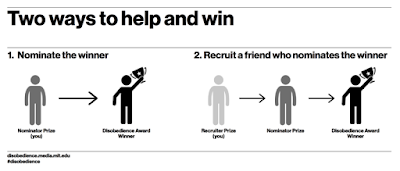Sometimes Innovation Requires Disobedience
 Kim BellardThe M.I.T. Media Lab is taking nominations for its Disobedience Award, which was first announced last year. As the award's site proudly quotes Joi Ito, the Director of the Lab and who came up with the idea: "You don't change the world by doing what you are told."
Kim BellardThe M.I.T. Media Lab is taking nominations for its Disobedience Award, which was first announced last year. As the award's site proudly quotes Joi Ito, the Director of the Lab and who came up with the idea: "You don't change the world by doing what you are told."
I love it.
The site, and the award's proponents, make clear that they are not talking about disobedience for the sake of disobedience. It's not about breaking laws. They're promoting "responsible disobedience," rule-breaking that is for the sake of the greater good. The site specifies:
This award will go to a person or group engaged in what we believe is an extraordinary example of disobedience for the benefit of society."
In Mr. Ito's original announcement, he elaborated:
The disobedience that we would like to call out is the kind that seeks to change society in a positive way, and is consistent with a key set of principles. The principles include non-violence, creativity, courage, and taking responsibility for one's actions."
Given all that, $250,000 hardly seems enough, and it's a shame there can be only one winner.
The are two ways to participate: you can either nominate the eventual winner, or you can recruit someone else to nominate the winner. Either way, you get to be flown to the awards ceremony on July 21, 2017. Nominations close May 1 (and, no, it doesn't appear that being late to apply is the kind of disobedience they'll reward).
The award is funded by Reid Hoffman, the founder of Linkedin, who recently wrote about it on that platform. His article is titled "Recognizing Rebels With A Cause," which is probably a good way to think of it. Although one often thinks of disobedience in a Thoreau-type civil disobedience, Mr. Hoffman ties it closely to innovation:
In the realm of entrepreneurship, almost every great triumph has its roots in disobedience or contrarianism of one kind or another. And ultimately this impulse doesn't just create new products and companies, but also new industries, new institutions, and ultimately new cultural norms and expectations.
The Media Lab, he points out, serves as an example of how this can work: "researchers with widely varying areas of expertise are encouraged to collaborate and improvise in ways that become not just multi-disciplinary but antidisciplinary – disobedient."
Ethan Zuckerman, the Director of M.I.T.'s Center for Civic Media, told The New York Times: "In a lot of large institutions there’s really two ways you make progress. You make progress when people follow the rules and work their way through the processes, and then sometimes you make very radical progress by someone who essentially says, ‘Look, these processes don’t work anymore, and I need to have a radical shift in what I’m doing.’”
It just takes someone to stand up.
The creators of the award are probably not thinking much about health care -- despite disavowing it is about civil disobedience, many examples they've given revolve around people resisting what they think are improper government actions -- but they should be.
If there's a field where lots of stupid, or even bad, things happen to people , through design, indifference, or inaction, health care has to be it.
Every day, in every type of health care setting, things happen that aren't in the best interests of the people getting care. People realize that they are happening, and, in many cases, they're happening because the rules say that is what is supposed to happen.
The list of disobedient acts in health care that would serve society is longer than my imagination can produce, but here are some examples:
- The nurse who says, no, I'm not going to wake up our patients in the middle of the night for readings no one is going to look at (or blood samples that can wait until morning).
- The doctor (or nurse) who knows a doctor that they believe is incompetent and decides, I'm going to speak up about it. I'll make sure patients know.
- The billing expert who decides, no, I'm not going to keep up the charge master, with this set of charges that aren't based on actual costs and which almost never actually get used (except by those unfortunate people without insurance). Instead, we'll have a set of real prices, and, if we give anyone any discounts, they will be based on ability to pay, not on type of insurance.
- The EHR developer who realizes that, it's silly that this institution's EHR can't communicate with that institution's EHR, even though they use the same platform and/or use the same data fields. Data should go with the patient.
- The insurance executive who vows, I'm tired of selling products that are full of jargon, loopholes, and legalese, so that no one understands them or knows what is or isn't covered. We're going to sell a product that can be clearly described on one page using simple language.
- The practice administrator who understands that patients' time is valuable too, and orders that the practice will limit overbooking and will not charge patients if they have to wait longer than 15 minutes.
- The medical specialty that commits to being for patients, not its physician members, by developing measures, specific to patient outcomes, in order to validate ongoing competence. The results of measures would be made public, reported to licensing boards for action, and used to de-certify their specialty designation for physicians not meeting required performance.
| Sometimes Innovation Requires Disobedience was authored by Kim Bellard and first published in his blog, From a Different Perspective.... It is reprinted by Open Health News with permission from the author. The original post can be found here. |
- Login to post comments

